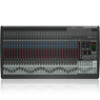Behringer EURODESK SX3282 Brochure - Page 2
A Million Ways To Change, The Channel, Hitch your art to the AUX
 |
View all Behringer EURODESK SX3282 manuals
Add to My Manuals
Save this manual to your list of manuals |
Page 2 highlights
EURODESK SX3282 Inserts on all mono channels, subgroups and main Balanced inputs and Main outputs for highest signal integrity High-precision, 13-segment LED meter for main mix Long-wearing 60-mm logarithmic-taper faders and sealed rotary controls Internal autorange power supply for maximum flexibility (100 - 240 V~), noise-free audio, superior transient response plus low power consumption for energy saving High-quality components and exceptionally rugged construction ensure long life Conceived and designed by BEHRINGER Germany Page 2 of 6 You also get eight buses, allowing you to assign multiple channels-say all the mics on a drum kit or all the backup singers' mics-to a single fader. Best of all, you don't need a black belt in engineering to operate the SX3282. The mono channels are grouped along two-thirds of the board, featuring dials in uniform primary colors (Gain in white; EQ in blue; AUX in red; Pan in black). Sub groups are located next door to the Main and Mono faders in the bottom right corner. Directly above, there's a handy built-in talkback mic that sends signal to your AUX 1-2 monitors via a push button, as well as a multi-purpose 13-LED master level meter to give you a dynamic visual gauge of the selected output. The SX3282's intuitive patch bay makes it equally at home in the club or studio. You get two balanced XLR MAIN outputs as well as a two ¼" TRS MAIN outs. There's also a ¼" MONO OUT (perfect for a subwoofer output). Eight SUBGROUP OUT jacks allow you to send your buses to an external recording device. This section also includes AUX SEND jacks for connection to monitors, CD/TAPE input and output jacks, and FX send/return jacks for use with outboard effects processors. Directly below, you'll find the ¼" headphone/control room out jack. A Million Ways To Change The Channel At the top of each mono channel, you'll find both a balanced XLR input with a XENYX mic preamp and a ¼" input. A phantom power switch located on the back near the main power switch accommodates condenser mics. Each mono channel has a 3-band EQ with semi-parametric mids (giving you control of the Mid level and a sweepable frequency with a boost or cut of 15dB) and a Trim control for adjusting input gain via a Level Set LED. A Low Cut button eliminates the frequencies where unwanted infrasonics such as mic handling noise occur. The eight AUX dials control the volume of the AUX SEND ¼" output signals (more on that below). Stereo channels feature the same functions, but a with dual ¼" inputs and a different EQ. Instead of sweepable mids, stereo channels feature High Mid and Low Mid dials, both with bell center frequencies set at 8 kHz and 800 Hz, respectively. This is especially useful for EQ'ing the critical midrange frequency content found in keyboard signals. Near every mono channel's fader you'll find a 1-2, 3-4, 5-6, 7-8 and MAIN button. By engaging the MAIN button, the signal is sent to the main mix. Or, if you engage the 1-2 button, the channel becomes part of a bus. Twist the PAN control all the way to the left to assign it to Sub 1, or all the way to the right for Sub 2. The same principle applies to the 3-4, 5-6 and 7-8 buttons. A Mute button with accompanying LED cuts the signal from the channel, and a Clip LED helps you dial in a distortion-free post-EQ signal. The Solo button on individual channels routes the subgroup signal to the solo bus or Pre-Fader Listen-depending on whether the signal has been included in a subgroup. Finally, each of the eight buses feature an independent fader, Solo switch, and Left and Right buttons to assign them to Left or Right stereo channels. Hitch your art to the AUX The SX3482 has eight AUX SEND outputs as well as eight AUX return inputs, giving you more routing options than a Los Angeles road map. AUX SEND 1-8 allow you to send the signal governed by an individual channel to an outboard FX unit or EQ. Meanwhile, the AUX returns can be thought of as eight extra line inputs working as four stereo pairs. You can apply up to 20 dB of gain to these inputs. AUX returns 1, 2, 7 and 8 allow returning FX to be sent to tape, and, along with 5 and 6, are also good for cuing artists via headphones. AUX returns 3 and 4 are always assigned to the main bus. Continued on next page









